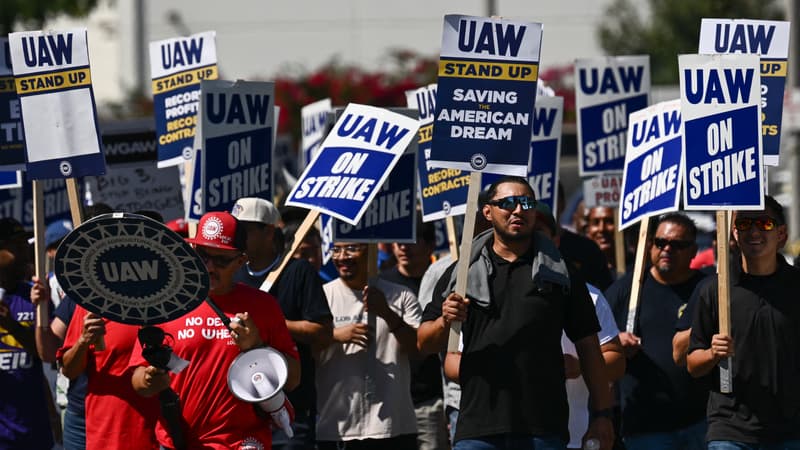In the United States, the strike launched by the UAW automobile union in mid-September began to gain momentum and mobilized nearly 34,000 employees. What’s more, the union launched a call this Monday to expand the mobilization at an important Stellantis factory in Michigan that produces the Ram 1500 truck. If General Motors remained firm in its positions, Ford and Stellantis this Saturday cracked under the pressure.
A draft agreement reached with union workers
Stellantis, the manufacturer with 14 brands (Jeep, Peugeot, Fiat, Chrysler, RAM, Citroën, etc.), followed Ford’s example and reached a draft agreement with the UAW union. The latter agreed to increase workers’ salaries by almost 25% and adapt them according to inflation.
In the process, General Motors expressed its desire to align itself without giving up on the permanence of precarious workers with short contracts. It is, therefore, the last manufacturer that has not overcome the deadlock with the union organizations.
Joe Biden “applauds” the draft agreement
Even US President Joe Biden had interfered in the matter to help in negotiations, particularly in favor of workers. The latter “applauded” the draft agreement that “rewards auto workers who have sacrificed so much to revive our auto industry, with record raises, more paid vacations, more retirement security, more rights and respect at work.”
For his part, UAW President Shawn Fain congratulated himself in a video and declared: “On day 44 of our strike, I am honored to announce that our union is once again victorious. […] The sums put on the table by Stellantis have increased 103% since the start of the strike, we have begun to turn the tide of the war waged against American workers and we are truly saving the American dream.”
General Motors continues to suffer Chinese torture
Closed in February, the Belvidere plant in Illinois is today at the center of Stellantis’ strategy to hire laid-off workers. The manufacturer proposed to integrate a new production line for a new car model and turn it into a full-fledged automotive spare parts market. If this allowed Stellantis to convince the UAW, General Motors’ proposals were not convincing.
It is the issue of short contracts that paralyzed the negotiations: Ford agreed to make its precarious workers permanent, Stellantis fell in line but General Motors refused to give in (almost 10% of its contracts are affected). In response, the UAW continued its strategy of tormenting China, which amounts to gradually disrupting more and more industrial sites if negotiations are unsuccessful. The Spring Hill Assembly Plant in Tennessee is affected and officially goes on strike.
The cost of the strike is estimated at $1.3 billion for Ford
This therefore makes it possible to put pressure on the automobile groups, whose bills increase as the strikes persist. These moves have already cost Ford $1.3 billion and General Motors $800 million, and both have had to revise their earnings forecasts and electric transition ambitions. These disruptions come at a critical time for the automotive industry, which needs significant funds to invest in electric vehicles.
Last step: union ratification of the agreement that will allow us to really move forward. A process that should take several weeks before the UAW actually ratifies an agreement.
Source: BFM TV


